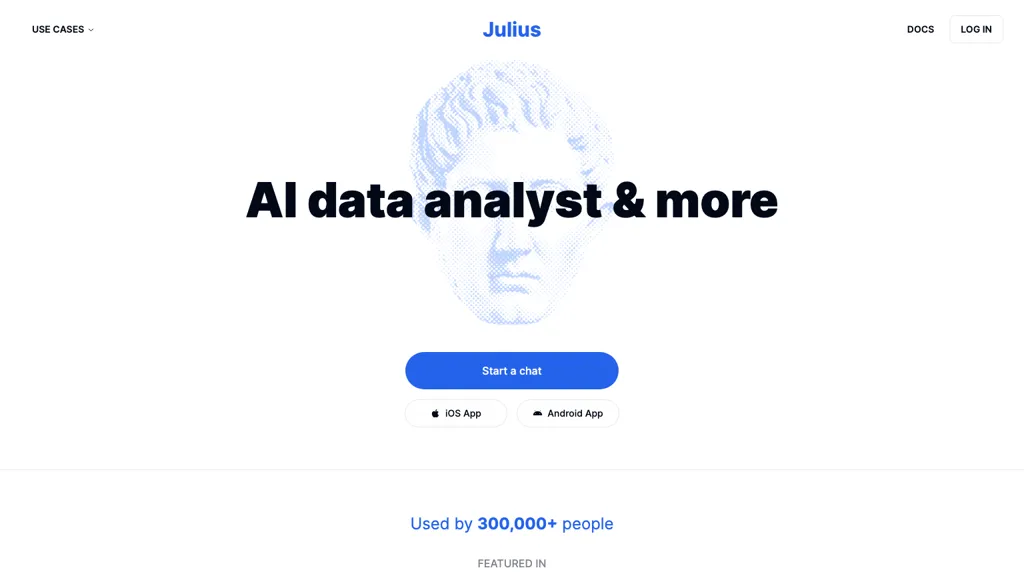What is Julius AI?
Julius AI is a wonderful data analytics application with the ability to handle structured and unstructured data. Like Google Sheets and Postgres databases, it can support other data types, including spreadsheets. For more complex analytics, it’s possible to put up linear regression, modeling, and even coming up with projections through Julius AI. It provides life for its users by visualizing the data with simple instructions and making it quickly possible to present the findings in a compelling way.
Julius AI is specifically developed to cater to the needs of the user, automating processes of data preparation and cleaning so that the user’s focus is not shifted towards the tiring process but instead remains on his core analysis. Easily export data in either CSV or Excel format to share with others.
More impressively, it has a ChatGPT plugin, which users can question about the data and obtain prompt answers. An individual with negligible technical know-how can use it as the user interface is very friendly; it allows importing several file types, which makes it flexible and adaptive.
Julius AI Key Features & Benefits
- Data Visualization Generation: Create cutting-edge, informative data visualizations in minimal time.
- Advanced Analytics Capabilities: Linear regression, model, and project complex analyses.
- Automation of Data Cleaning: Automated painful data preparation and cleaning to save valuable time.
- Quick Data Export: Quickly export analyzed data into CSV or Excel format for sharing with others and further use.
Julius AI expedites the process of analyzing data, and the same is more applicable for data professionals. Prominent features of this tool are that it can easily consume data, unstructured or structured; an attractive, easy-to-use interface; and inclusions of some of the most powerful advanced AI models for quick insight.
Uses/Application of Julius AI
The uses of Julius AI can be found in typical scenarios that include:
- Systematic and sophisticated data analysis on structured and unstructured sources.
- Developing animations of data to communicate results and insights most aptly.
- Automating preparation and cleaning completely to free up resources to perform the actual acts of analysis.
Some of the industries that have benefited and will benefit from Julius AI include finance, business intelligence, data science, among many others. Data analysts, business intelligence professionals, data scientists, business analysts, and financial analysts are among the major users of Julius AI; these people use the technology to enhance data analysis.
- Choose Analysis Type: Linear regression or modelling of data.
- Automate Data Cleaning: Apply Julius AI automated data cleaning features when preparing data intended for analysis.
- Generate Visualizations: Visually present your data in a manner that paints a clear picture for your audience.
- Export Results: Share your results by downloading them in CSV or Excel format.
Note: For the best results, use Julius AI’s ChatGPT plugin to ask data-specific questions and get quick answers precisely.
How Julius AI Works
Julius AI works with sophisticated algorithms and models to make data analysis easier. There are a few general steps that work within Julius AI, including data importation, the cleaning process automated, the desire for analysis done, and visualizations built. In every step, the intuitive interface helps users proceed through the course of using the tool, even for users with relatively weak technical backgrounds.
This would include integrating AI models, such as the ChatGPT plugin, for further development of the tool in order to let users ask questions about their data for instant insights to make the process even easier.
Pros and Cons of Julius AI
Pros:
- Automates cleaning and preparation, thus saving a lot of time.
- It supports several sources and formats of data.
- Easy-to-use interface that requires end-users of any skill level.
- Allows for higher functionality analysis, such as data animation.
- Fast export options for sharing your results.
Cons:
- Limited features are available on the free plan.
- May have a slightly steep learning curve for very involved analyses.
Overall user sentiment is that the tool is great in terms of efficacy and user-friendly features; however, some limitations on the free plan are a small con.
Conclusion about Julius AI
At the end of it all, what makes Julius AI is its power and user-friendliness for the analysis of data. It is the ability to process structured and unstructured data, enhanced by important analysis and visualization features. The free version simply gives one a fair start, while upgrading is a door to how the tool functions at its full capacity.
Successive development and updates in the future will keep it even more competitive and at the edge among all data analysis technologies.
Julius AI FAQs
Q: What type of data does Julius AI analyze?
A: Julius AI can analyze structured and unstructured data, including spreadsheets, Google Sheets, and Postgres databases.
Q: Does a free plan exist?
A: Yes, Julius AI does have a free plan, enabling the user to send up to 15 messages per month with the benefit of advanced AI models.
Q: How is data privacy handled in Julius AI?
A: Data is safe with Julius AI because it has firm data policies which put one’s mind at rest.
Q: Can I export my analysis results?
A: Yes, easily; one can export their analysis results in CSV or Excel formats that will be shared with others.
Q: Who are the immediate beneficiaries using Julius AI?
A: Immediate beneficiaries in using Julius AI are the data analysts, business intelligence professionals, data scientists, business analysts, and financial analysts.










